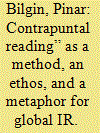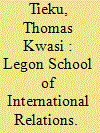| Srl | Item |
| 1 |
ID:
145125


|
|
|
|
|
| Summary/Abstract |
How to approach Global International Relations (IR)? This is a question asked by students of IR who recognize the limits of our field while expressing their concern that those who strive for a Global IR have been less-than-clear about the “how to?” question. In this article, I point to Edward W. Said’s approach to “contrapuntal reading” as one way of approaching Global IR that embraces diversity and reflects multiple and overlapping experiences and perspectives of humankind. More specifically, I suggest that contrapuntal reading offers students of IR a method of studying world politics that focuses on our “intertwined and overlapping histories,” past and present; an ethos for approaching IR through raising the “contrapuntal awareness” of its students and offering an anchor for those who translate the findings of different perspectives; and a metaphor for thinking about Global IR as regional and global, one and many.
|
|
|
|
|
|
|
|
|
|
|
|
|
|
|
|
| 2 |
ID:
183221


|
|
|
|
|
| Summary/Abstract |
The article explores the Legon School of International Relations (LSIR) which is the research, teaching, and academic programming of International Relations (IR) at the University of Ghana, Legon. The LSIR came out of attempts to decolonise knowledge production, dissemination, and academic programing in Ghana in early 1960s. The article shows that the LSIR is decolonial in theoretical perspective, grounded in southern epistemologies, relational in ontology, qualitative in methodology, practice-based, and it is equity-oriented. Although the LSIR scholarship as a package is distinctive, some of its ideas overlap with the work of several contemporary IR communities in the West. The article highlights implications of the LSIR story for the IR communities in the West and the value of paying close attention to the works of IR centres of scholarship in Africa.
|
|
|
|
|
|
|
|
|
|
|
|
|
|
|
|